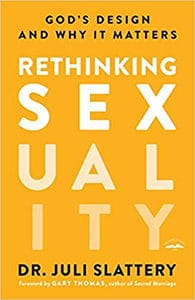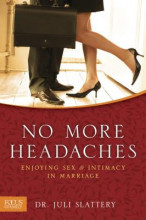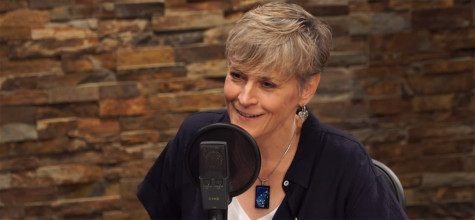Opening:
John Fuller: Today on Focus on the Family, we’ll cover a very difficult challenge in our culture’s day. Even for those of us in a Christian community, and this isn’t a topic recommended for younger listeners. You may wanna direct their attention elsewhere.
Excerpt:
Juli Slattery: And so sex is less than God intended it to be. It’s what I call sexual activity instead of sexual intimacy. Now, if I meet a couple who will really describe sexual intimacy, fulfilling sexual intimacy for both of them, I know that couple has been on a long journey of learning to communicate, learning to forgive each other, learning to show each other grace, learning to seek God because it’s impossible to achieve that without walking through selfishness and brokenness. And it can be achieved by God’s grace. But it doesn’t just naturally happen.
End of Excerpt
John: That’s Dr. Juli Slattery describing how we all need to live out our God given sexuality in authentic ways. Your host is Focus president and author Jim Daly. And I’m John Fuller.
Jim Daly: John, I’ve always been struck by the irony of how reluctant the church has been to discuss issues like physical intimacy, I mean, even sex education. That’s probably a little more comfortable because it’s a must-do, or the moral brokenness that’s so rampant in our culture today. And we have got to turn that around. Backing up or backing out of that conversation is probably the worst decision we can make for our young people within the church.
And the fact is we know God’s truth about these issues, how He created us, male and female, and designed the one flesh relationship in marriage. It’s right there in Scripture, that the two will become one flesh. It’s a beautiful concept, but we rarely ever talk about these things. And when we do, we tend to get a bit of criticism about it. But can I really try to appeal to those of you who want to be critical? We’ve got to talk about healthy sexual relationships within Christian marriages and what is expected and what should be the attitude that we possess in our relationships, physically. We talk a lot about emotional intimacy and spiritual intimacy. But we have to be courageous enough to talk about this so that we can be healthier in our physical relationship.
How did we get so far away from God’s design? I think is one of the big questions. And today we have a wonderful guest who will talk with us about her great new book Rethinking Sexuality.
John: Yeah, Dr. Juli Slattery has given a lot of thought to God’s truth and brings a lot of compassion and insight into this topic. She’s a clinical psychologist and, for a number of years, a colleague here at Focus on the Family in this very studio. And we’re so glad to have her back. Dr. Slattery is the president and co-founder of Authentic Intimacy, a ministry devoted to reclaiming God’s design for sexuality. And as you said, Jim, she’s written this book, Rethinking Sexuality: God’s Design And Why It Matters. Of course, we have copies of that at our website.
Body:
Jim: Juli, the phones are ringing off the hook for a copy of your book (laughter). I love it. Welcome back.
Juli: Oh, it’s great to be back.
Jim: Man, you have been speaking and counseling a lot of folks since you left Focus on the Family. What is – probably, the big question – what is going on in the culture? Why does the Christian culture so easily follow the worldly culture? What is going on there? Is it the lowest common denominator, so we’re just rolling that way?
Juli: Well, as we look through church history and biblical history, you see that the church has always taken on the flavor of the culture. That’s always the challenge, that we worship God, but we mix kind of what the culture’s doing…
Jim: Culture has influence on us.
Juli: Yeah, for sure. I mean, whether it was early church Judaism and legalism that influenced the church or whether it was the Greco-Roman idolatry and thinking of that day. But today we live in a very humanistic, individualistic, moral relativistic culture …
Jim: Yeah.
Juli: And so the church is taking on some flavor of that in every area, but I think particularly related to how we view sexuality.
Jim: Yeah, you described a blog post from a woman who tried to do everything right with her purity, but then something went wrong. What happened? I think it’s a depiction of so many young women, particularly, in the church today.
Juli: Yeah, you know, we – we look at the negative impact of what I call the cultural narrative about sex, that anything goes, you know, just you do you kind of thing. But I think we also have to look at the negative impact of some of the incomplete teaching the church has done on sexuality. And I call that the purity narrative. And that’s what this blog post is about. And you’re right, Jim, it represents what, particularly, a lot of young women are struggling through. When they grow up, like this woman did, hearing save sex for marriage, don’t ever make a man stumble, make sure you’re modest, and that’s all they ever hear about sexuality…
Jim: And those are good things.
Juli: …They are good things. But they’re incomplete things. It’s not the whole picture.
And what that does is it sets people up for this idea, particularly women, that there are two categories. Uh, there’s the sexually pure, and there’s the sexually impure. And this woman describes how she made it one of her life goals to stay pure until she got married. She thought this was how God would love her, if she did that. And so she and her boyfriend, as they were dating and engaged, tried really hard to set boundaries. And then they got married, and they expected to have this amazing honeymoon. And what she says in her blog post is, “There were no shining lights or no angels singing, but I ended up in the bathroom mat afterwards crying, sobbing because I – I was, like, I was supposed to feel like God would love me now and I’m a good Christian. But instead, I just feel all this shame. And I don’t know what to do with it.”
Jim: Well, and I think the other aspect that people could hang onto, and what I caught in that story as I read it, was her identity had become that. And all of a sudden, she gets married and she has to flip the switch.
Juli: Right.
Jim: And her – in essence, her identity about her purity was now being given over. And she couldn’t manage that emotionally.
Juli: Right.
Jim: There’s a lot – and I think predominantly women – but a lot of people in the church when – they’re in that spot, where they’re saving themselves. It’s a good thing, obviously. But how should they manage that moment so that it’s healthy? How do you flip that switch?
Juli: I don’t think it’s about managing a moment. And I think that’s part of the limitation of how we’ve addressed sexuality in the church. We’ve – we’ve narrowed it down to a moment. And we’ve narrowed it down to one session in your premarital counseling that’s supposed to prepare you for what it means to be sexual.
Juli: And so a lot of my heart in what I do in ministry is helping people understand a concept I call sexual discipleship…
that we can’t just have this idea of, you know, one lecture to the youth group on a weekend about purity and one session for premarital couples. The world is discipling us in our sexuality. And the church has to do the same thing, realizing that sexuality does touch on our identity. We’re sexual people from the time we’re born to the time we die. And we need to understand God’s heart for us all through those life stages, including his heart for us when we fail and when we experience shame and if and when we experience trauma. And so I really believe the church needs to have a comprehensive messaging and ministry to both men and women in helping them understand God’s heart for their sexuality.
Jim: Yeah, it’s a great concept, one I totally support it. Juli, you believe one of the biggest challenges Christians face today is the disconnect between our behavior and our identity as followers of Christ. I mean, that’s for sure. In fact, you have several stats about Christian beliefs regarding cohabitation, premarital sex and so on. What are some of those stats?
Juli: Yeah, and even as I quote these stats – they’re outdated – because we’re finding, as studies are being done, that every year, not only the larger culture, but the Christian culture is becoming more liberal in terms of our view of what’s morally acceptable. So here are a few that I pulled from a recent study. Forty-one percent of practicing Christians believe that cohabitation is a good idea. More than 60% of Christians on a Christian dating website said that they would have sex before marriage.
Jim: Sixty percent.
Juli: Yeah.
Jim: People need to grab that.
Juli: And that’s…
Jim: These are Christian kids, young people.
Juli: And they’re young, saying, “I would have sex before marriage.” This is not counting the people that would say, “No, I hold a standard of purity” but still struggle and fall into that. Thirty-two percent of Christian men ages 18 to 30 admit to having an addiction to pornography – not just looking at it, but an addiction. And 54% of Christians believe that homosexuality should be accepted rather than discouraged.
Jim: So what does that say to you about what’s happening within the church?
Juli: Well, first of all, it says that the average Christian has a very limited understanding of God’s design for sexuality. They’ve memorized a list of rules maybe, but those rules no longer makes sense to them.
And we see this happening all the time, where people will use this term, they’ll say, “I’m deconstructing from Christianity because I can’t make sense of biblical sexuality.”
Jim: Yeah.
Juli: And so they hear the rule that maybe sex is designed for marriage, you shouldn’t have sex before you get married, but their experience of their desires, their experience of being a 32-year-old single person who wants to get married, who wants to have sex, but God hasn’t brought a spouse, their experience of having a good friend who’s homosexual, a good friend who’s transgender and who loves God, that creates what we call in psychology cognitive dissonance. Like, where’s God in the midst of this? So the Bible must be irrelevant or old-fashioned or we must be reading it wrong. And so then they conclude, well, I guess I can still love God but make up my own rules related to sexuality that are more consistent with my experience.
Jim: And that’s so good, Juli. You know, one of the things for me is I’ve engaged people that – that, you know, aren’t believers in Jesus. And I’ve sat and had, you know, a coffee with them or something to talk with them. So much of their identity can be wrapped up in their sexuality. And as I’m talking with them, I have used the very phrase that you use in your book, Rethinking Sexuality, which is we’re all broken.
Juli: Yes.
Jim: I mean, since the fall, we have – as humanity, we have it wrong. That’s why pastors fail. That’s why Christian leaders fail. That’s why Christians fail because we’re broken people. And the sexual attraction is probably the most basic of human experience, I think.
Juli: Yeah.
Jim: And to simply acknowledge that is so critical. And I’ve – I’ve seen, you know, homosexual men as I’ve talked to them just break down into tears to think that they’re like the rest of culture, that they’re struggling like we struggle, too. The difference I always say is that, you know, I’m trying to follow the book. I’m trying to follow God’s teaching on this. That’s what precludes me from doing things that I would do in my flesh. But it is releasing for them to hear that they’re broken, we’re broken, we’re all broken. How important is that?
Juli: Oh, I think it’s critical. And, you know, I think most people listening right now would agree with the statement you made, that we’re all broken. The Scripture talks about us all being sinful. Our hearts are rebellious.
But the way I say it, they might be shocked. I believe that we are all sexually broken because I think when it comes to conversations around sexuality in the church, we have an unspoken assumption that some people are sexually broken and the rest of us are just fine.
Jim: Fine in hiding (laughter).
Juli: Right, yeah so, you know, hey, are you having sex with your married – your partner? Are you having sex with your spouse? OK, you’re good. We don’t need to go any further than that. And that’s the assumption in the church, is if you’re looking at porn, if you’ve been sexually abused or if you’re same-sex attracted, you’re broken. But the rest of us are – are doing it right and we have no problems.
But the reality is that if you scratch the surface, there’s not one of us that hasn’t had our sexual drives and desires tainted by lust, by sin, by selfishness, by just feeling inadequate. And so a lot of my work over the last six or seven years has been delving into the hidden forms of brokenness. Because we don’t talk about them, it has really set up an us-versus-them paradigm in conversations around sexuality, where the fixed people, the whole people, are trying to fix the broken people.
Juli: And – and it’s so critical for us to get to the place where we not only say we’re all sinful and we’re all broken, but we are – every single one of us – sexually broken. Pastors, leaders, even those who got married as virgins, even those who aren’t looking at pornography, sexuality has been distorted by the enemy, by your sin nature, by our culture. And we all need God to bring truth and redemption in that area.
Jim: OK, let me play the opposite role of that so you can bounce off of this. But if I was that person – save myself for marriage. I did it all right, even made that transition in a healthy way. I’m saying, “No, Juli, you’re wrong. I mean, I did it well. I’m living a good, healthy sexual life with my spouse. We’re fulfilled. You’re telling me I’m still broken? I don’t see it.”
Juli: Well, I would ask a lot of questions. You know, first of all, I’d ask – I – how does your spouse feel about that? Um, because…
Jim: (Laughter) No, you can’t ask that question! (laughter)
Juli: See, because a lot of my work is with women. And yes, there are a lot of men who feel sexually unfulfilled in their Christian marriage where they’re like, “My wife isn’t as interested in sex as I’d like her to be.” But there’re an awful lot of women who feel very unfulfilled sexually in their Christian marriages because they see sex as a transaction, that their husband is saying, “This is important to me. We haven’t done it in a while.” And meanwhile, her heart is lacking. She doesn’t feel loved and cherished. She doesn’t even feel like her husband really understands her sexually.
And so sex is less than God intended it to be. It’s what I call sexual activity instead of sexual intimacy. Now, if I meet a couple who will really describe sexual intimacy, fulfilling sexual intimacy for both of them, I know that couple has been on a long journey of learning to communicate, learning to forgive each other, learning to show each other grace, learning to seek God because it’s impossible to achieve that without walking through selfishness and brokenness. And it can be achieved by God’s grace. But it doesn’t just naturally happen.
John: That is really good, Juli. And I appreciate the kind of the long-term perspective that you’re offering us, kind of layered in with God’s design – his beautiful design – for sexuality. Dr. Juli Slattery is our guest today on Focus on the Family. And we’re covering some of the content in her book Rethinking Sexuality: God’s Design And Why It Matters. We have copies of that and other resources, including CDs or downloads of this broadcast, in full at focusonthefamily.com/broadcast.
Jim: Juli, oftentimes we’re looking to Scripture rightfully to get that guidance. Jesus had two – at least two – very straightforward encounters about sexual behavior – the woman at the well. The woman caught in adultery is another wonderful example. How do you see Jesus’s attitude toward our human sexuality? What did he describe? And what do we need to learn from the way he dealt with people that were struggling?
Juli: Hm, he was so gracious in those interactions that you mention. Particularly the woman who was caught in adultery, his interaction is not just with the woman, but it’s with her accusers.
Jim: Right.
Juli: And her accusers are looking at her behavior and the law and what she deserves. And he’s looking at her heart and their heart, their hypocrisy, and convicting that hypocrisy. And we’ve got to remember that Jesus confronts our behavior to get to our heart. And so often, I think, when we talk about sexuality in the church, it’s only about behavior. It’s focused on morality rather than also pushing into maturity.
And what Jesus did with those two women that you mentioned in his encounters is he was addressing sexuality to get to the deeper need, the deeper issue, the deeper longings of the heart. And so I believe that we also need to follow that example that don’t get just stuck on arguments and debates about what behavior’s right or wrong, what Scripture says about this or that. There’s a time for those discussions. But if those discussions aren’t working towards the heart, aren’t calling us towards maturity and real interaction and intimacy with God, then we’re missing the point.
Jim: Yeah.
I don’t know if I can articulate this well, and I’m sure some people will be critical of what I’m about to say, but it seems to me, Juli – and I want your response to this – when you look at the way we see the world and we see human sexuality, we almost treat God like he’s an old grandfather who doesn’t understand, and we don’t want to expose him to it. He created it. I mean, but we have this attitude that it’s in the closet, it’s unknown to God, that somehow he does not understand the struggles that we have. And at the same time, it’s clear – out of those two examples right there – that idea that sin is going to occur. It’s what we do with it and how God teaches us through it and how we respond to it to make us healthier. And I think that’s – that’s all of life, isn’t it? Not just …
Juli: It is.
Jim: …In sexuality. But this life is tilted against us so that we have to learn these lessons. It’s almost like the Lord has set it up so we will fail and either fall toward him or fall toward the world. Is that a fair assumption?
Juli: It really is. And I think, Jim, that has so many implications for how we deal with sexuality in the church but also in marriage and in our parenting.
Jim: Absolutely.
Juli: So for example, if your goal is I just want to keep my kids away from all sexual immorality, from all sexual sin, that’s not necessarily a bad goal, but it’s not the ultimate goal. And the reality based on research is that all of our kids are going to be exposed to and make some poor sexual choices.
Jim: Yeah.
Juli: The question is then, how do you respond as a parent? Is it, oh, no, I failed, they failed? Or is it with a gospel mindset of how Jesus interacted with people? Where’s your heart? And this is why Jesus died. And this is why we need to be so dependent on him.
And so shifting that paradigm to thinking about, again, discipleship, discipling the heart of your spouse, discipling the heart of your children is so different than just how do we control moral behavior. Jim: Right, and I think, you know, again, scripturally, what’s the indication? You look at David – King David – he wouldn’t qualify for being an elder at a church. Yet, he had a heart for God, according to God himself. And when we try to wrestle with that and reconcile that, I mean, it’s hard. But I think the lesson there is that David found God in the valley, in the bottom. He understood the wicked – wickedness that was in him. And that’s the key. Can you see it in yourself? And do you want to change?
Juli: Yeah. Absolutely.
Jim: Um, speaking of that, do you have an example of those that you’ve counseled that fits this? Maybe it’s your own life experience. I don’t know. But how does a woman – you mentioned that earlier, that many women you counsel struggle with this fulfillment in this area, and it feels transactional when it comes to physical intimacy with their husbands.
How have you seen kind of that healthy transition, much like we’re talking about David? How does a woman go from that feeling to knowing what she needs to do and not feeling bad about it?
Juli: Yeah. And I think it’s not just the woman. It’s the couple.
Jim: Yeah!
Juli: It’s the married couple. And part of that is really helping people to see that sexual intimacy is a journey, and you’re just beginning the journey in your marriage when you get married, instead of presenting it as, “Wow, you reached the finish line; now you get to go have fun,” (Laughter) and setting up these expectations.
The analogy that I like to use because people relate toward pictures is that the gift of sex is actually a gift more like Legos. Because if you buy a box of Legos and you see on the front of the box a Batmobile, for example, and you open up the box and you think you’re getting the Batmobile, you’re going to be really disappointed. You open up the box and you see hundreds of pieces that don’t seem to fit together. You don’t know how to build them, but you have to learn. And that’s why kids love Legos – is because they’re creating; they’re learning. And I really believe the gift of sex is more like that. When a husband and wife understands that they’re opening up something that is mysterious, that is going to take time to build and they see that even in the frustration, even when they need to forgive each other, God is teaching them a very tangible way to show love, then the frustration has a purpose. And when a woman really begins to understand that God doesn’t want you to settle for that transactional approach to sex, that he’s calling you and your husband to deeper maturity, to deeper intimacy, communication, love, then I see couples start to get excited about, OK, well, we – like, nobody’s ever told us we should be building something, so how do we start?
John: Hm.
Jim: And that’s really good, really good.
Juli, let’s end here. Um, I understand you discovered an area of disconnect in the relationship you had with your husband Mike. I know Mike. You wanted to surrender your life fully to God and you were surprised by his response…
Juli: Yeah.
Jim: …God’s response. What happened?
Juli: Yeah, see, this is a good example of what I was even just talking about. A lot of the things we’ve discussed from the outside and from the surface, you would look at our marriage and say, “They’re doing it right. Mike and Juli are doing this the right way. Juli’s a good, godly wife.” And the Lord convicts us in areas that we don’t know we even need convicting in.
And for many years of our marriage I was like probably a lot of Christian wives, who are like, oh, that sex thing. I don’t really love it, but it’s my duty as a wife, and, um, busy with kids and just trying to avoid it a lot. And I can remember one particular evening when I was really telling the Lord from a genuine heart, you know, “God I want to serve you. I want to be surrendered to you.” And the Lord began convicting me about my attitude towards sex and just how I had been avoiding it. And he just prompted me, like, “If you want to love me, go up and love your husband well.”
And that started me on a journey that has continued for years now. Not just of saying I need to make sexual intimacy a priority, but what is it in my heart and in my body, even, that keeps me from fully embracing this gift that God has given? Because if my sexual intimacy with my husband is less than what God designed it to be, that means Satan owns that part of me. And I don’t want him to have any part of me.
Jim: Yeah, and Juli, I so appreciate that vulnerability. And, you know, there’s obviously the man’s responsibility – Mike, in this case, as well – that represents how we need to behave in that physical intimacy. And I get that. But we’re kind of concentrating on what you’ve written in your book. And in that regard, now that you’ve had years passed by, you’ve applied this approach, God has, you know, gently spoken to your heart that way, what’s the fruit of approaching it with that attitude? How are you and Mike today? Is it different?
Juli: It is. Totally …
Jim: … Is your attitude different? Is your relationship different?
Juli: Yeah, it doesn’t mean that we don’t still struggle. I think part of the Christian life in any area is recognizing that we’re always going to struggle with sin. We’re going to struggle with even the brokenness in our bodies and in our hearts.
Juli: But it’s a completely different dynamic now. The communication, the goals that we have, even in sexual intimacy, of really wanting to become one in every area, wanting to serve each other and to learn about how to do that well, we never had those kind of conversations, the first 15 years of our marriage. We never knew that we’re supposed to have them.
Closing:
Jim: Well, and I can feel that critical spirit who’s living in not a healthy place saying, “No, I just can’t get there. I don’t know that.” So try something different. Ask the Lord to show you that way forward. Juli’s great book, Rethinking Sexuality, is a wonderful place to start, especially if you’re missing some of the rationalizations for why this would be a right way to go. I mean, Juli does a great job laying it out for you. And this has been a terrific conversation, Juli, a delicate one, so I applaud your courage. And you’ve done a wonderful job with this book. And I hope – if you are struggling, there are so many resources here at Focus on the Family, starting with our counselling area. If you need to talk to somebody, call us. We’ll probably have to call you back. But we will call you back. And they will talk with you and even be able to refer you to somebody in your area, most likely.
And then there’s lots of resources, tools in the toolbox, that we can help provide you as well. And let me also say we believe in this content so much that if you can help Focus financially, our way of saying thank you will be to send a copy of Juli’s great book, Rethinking Sexuality, and to encourage you in your relationship with your spouse, and if you’re not married, to encourage you on what that future could be.
John: Hm. And our number is 800, the letter A and the word family, 800-232-6459. That’s to connect with our counseling team or to find resources. Or you can stop by focusonthefamily.com/broadcast.
Coming up next time, what do you do when beauty and body image becomes a problem in your family?
Teaser:
Young Girl: I like my red hair, my green eyes, and my freckles, but I think I’m fat. Mom says I’m not too skinny, not too fat, but I think I’m really chubby.
End of Teaser





















